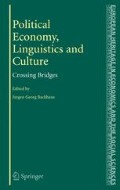Abstract
Interlingua is a means of communication among speakers of different native languages. If widely adopted for this purpose, it would have obvious economic advantages.
Access this chapter
Tax calculation will be finalised at checkout
Purchases are for personal use only
Preview
Unable to display preview. Download preview PDF.
References
Gode, A., and Blair, H. E. (1951). Interlingua: A Grammar of the International Language. New York: Ungar.
Hayek, F.A. (1967). “The Results of Human Action but not of Human Design.” In Studies in Philosophy, Politics, and Economics.Chicago: University of Chicago Press, Chapter 6.
Hazlitt, H. (1964). The Foundations of Morality. Princeton, NJ: Van Nostrand.
Heyne, P. (1991). Ekonomický Styl Myšlení. Translated from his The Economic Way of Thinking by a team headed by Ji_í Schwartz. Prague: Vysoká skola Ekonomická.
Heyne, P. (1991). Modul Economic de Gîndire. Translated from his The Economic Way of Thinking by Nicolae Nistorescu and Martin Frâncu. Bucharest: Editura Didactica_i Pedagogica.
International Auxiliary Language Association (1951). Interlingua-English: A Dictionary of the International Language. Prepared by the research staff under the direction of Dr.Alexander Gode. New York: Ungar.
Martinet, A. (1972). Elementos de LingUMListica General, 2nd ed. Translated from French by Julio Calonge Ruiz. Madrid: Editorial Gredos.
von Mises, L. (1983). Nation, State, and Economy. Translated from the German of 1919 by Leland B. Yeager. New York: New York University Press.
Smith, A. (1985). “Considerations Concerning the First Formation of Languages.” Originally 1761 and 1790. In Lectures on Rhetoric and Belles Lettres. Indianapolis: Liberty Classics, 203–226.
Smith, V. L. (1992). “Economic Principles in the Emergence of Humankind.” Economic Inquiry 30 (January): 1-3. [Another version appears as “The Economics of the Emergence of Humankind,” Liberty 5 (May 1992): 43–48, 51.]
Yeager, L. B. (1991a). “Le linguistica como reclamo pro Interlingua.” In Ingvar Stenström and Leland B. Yeager (eds.), Interlinguistica e Interlingua. Beekbergen, Netherlands: Servicio de Libros UMI, 46–57.
Yeager, L. B. (1991b). “Artificialitate, ethnocentrismo, e le linguas oriental: le caso de Interlingua.” In Ingvar Stenström and Leland B. Yeager (eds.). Interlinguistica e Interlingua. Beekbergen, Net11herlands: Servicio de Libros UMI, 58–72.
Yeager, L.B. (1993). “Interlingua for Communication and Linguistic Science.” In Language in Contemporary Society. Proceedings of a conference of October 1992. New York: American Society of Geolinguistics, 135–144.
Author information
Authors and Affiliations
Editor information
Editors and Affiliations
Rights and permissions
Copyright information
© 2008 Springer Science+Business Media, LLC
About this chapter
Cite this chapter
Yeager, L.B. (2008). A Language Bridge between Peoples and Disciplines. In: Backhaus, J.G. (eds) Political Economy, Linguistics and Culture. European Heritage in Economics and the Social Sciences, vol 5. Springer, Boston, MA. https://doi.org/10.1007/978-0-387-73372-2_1
Download citation
DOI: https://doi.org/10.1007/978-0-387-73372-2_1
Publisher Name: Springer, Boston, MA
Print ISBN: 978-0-387-73371-5
Online ISBN: 978-0-387-73372-2
eBook Packages: Business and EconomicsEconomics and Finance (R0)

